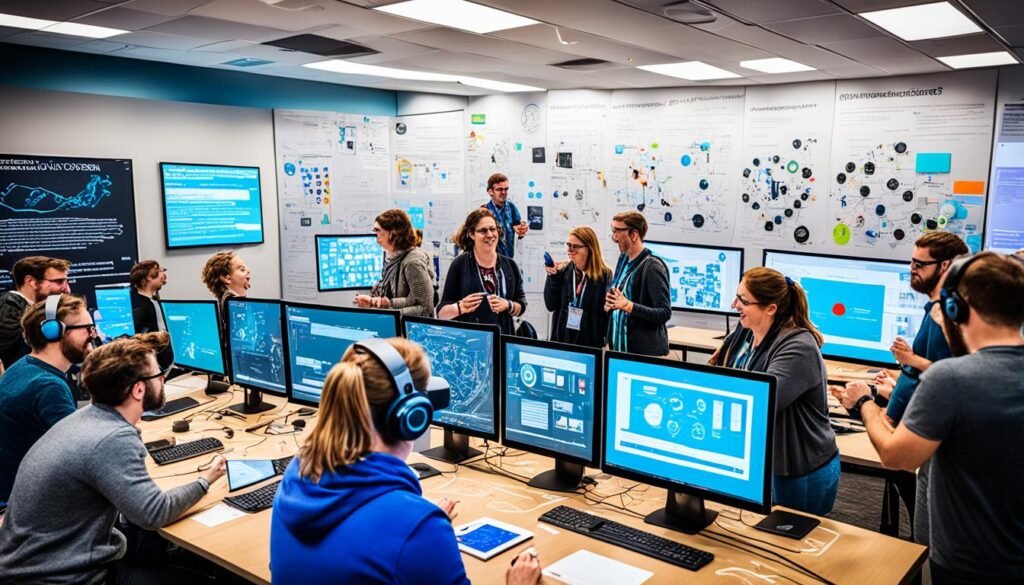Technology education plays a crucial role in shaping the future by driving innovation and empowering students to succeed in a digital world. It offers opportunities for individuals to acquire skills and knowledge in technology, enabling them to contribute to advancements in various industries.
Key Takeaways:
- Technology education prepares students for the rapidly evolving digital landscape.
- It fosters innovation and critical thinking skills.
- Technology education opens doors to job opportunities in various sectors.
- It contributes to the development of a technologically literate society.
- Efforts are being made to bridge the gender gap in technology education.
The Importance of Technology Education in Society
Technology education plays a vital role in today’s society, providing individuals with the necessary skills to navigate and thrive in the digital landscape. With the rapid advancement of technology, it is essential for everyone, regardless of age or profession, to have a basic understanding of technology and its applications.
Technology: From smartphones to self-driving cars, technology is ubiquitous in our daily lives. It influences how we communicate, work, and engage with the world around us. By embracing technology education, individuals can unlock its full potential and leverage its power to bring about positive change.
“Technology education is not just about using devices and software; it is about understanding how technology works and how it impacts our lives. It empowers individuals to become active participants in the digital revolution and equips them with the skills needed to thrive in the modern world.”
Education: Access to quality education is crucial for personal and societal development. By incorporating technology education into the curriculum, educational institutions can prepare students for the challenges of the 21st century and equip them with the digital literacy skills needed for future success.
Furthermore, technology education fosters critical thinking, problem-solving, and creativity, essential skills for individuals to adapt to a rapidly changing technological landscape.
Society: Technology has a profound impact on society, shaping how we live, work, and interact with one another. By promoting technology education, we can ensure that individuals are equipped with the knowledge and skills necessary to drive innovation, improve the quality of life, and address pressing societal challenges.
From tackling climate change to revolutionizing healthcare, technology education empowers individuals to make a positive impact on society by leveraging the potential of technology.
The Role of Technology Education in Career Development

Technology education plays a vital role in career development, enabling individuals to acquire the necessary skills and knowledge to pursue various technology-related fields. With the rapid advancements in technology, the demand for skilled professionals in areas such as computer science, engineering, and artificial intelligence is on the rise.
By providing students with a solid foundation in technology and practical experience, technology education equips them with the tools to excel in their careers. It goes beyond theoretical knowledge and focuses on practical, hands-on learning, preparing individuals for the challenges of the modern workforce.
“Technology education not only teaches students the technical skills required for a career in technology but also fosters problem-solving, critical thinking, and creativity. These skills are essential for success in today’s rapidly evolving and competitive job market.”
One of the key benefits of technology education is the vast range of career opportunities it opens up. From software development to cybersecurity, the possibilities are endless. Individuals with a strong technology education background can explore lucrative job prospects in both traditional and emerging industries.
In addition, technology education provides individuals with a competitive edge in the job market. Employers are increasingly seeking candidates who possess technological proficiency, as technology continues to play a pivotal role in businesses across all sectors. By acquiring relevant skills and knowledge, individuals can position themselves for success and advance in their careers.
Career Paths in Technology Education
| Technology Field | Job Positions |
|---|---|
| Computer Science | Software Developer, Data Analyst, Web Developer, Systems Analyst |
| Engineering | Electrical Engineer, Mechanical Engineer, Civil Engineer, Aerospace Engineer |
| Artificial Intelligence | Machine Learning Engineer, Data Scientist, AI Researcher, Robotics Engineer |
As seen in the table above, technology education can lead to a wide range of career paths. Each field offers unique opportunities and challenges, allowing individuals to pursue their passions and make a meaningful impact in their chosen industry.
Furthermore, technology education contributes to an individual’s personal and professional growth. It fosters lifelong learning, as technology is constantly evolving. By staying updated with the latest advancements, individuals can keep their skills relevant and adapt to the changing demands of their industry.
Overall, technology education plays a pivotal role in career development by providing individuals with the necessary skills, knowledge, and opportunities to excel in the technology-driven world. It opens doors to diverse job prospects, equips individuals with valuable proficiency, and supports personal and professional growth for a successful and rewarding career.
The Benefits of Technology Education for Students

Technology education offers numerous benefits for students. It enhances their problem-solving and critical thinking skills, fosters creativity and innovation, and prepares them for the rapidly evolving digital landscape. By equipping students with the necessary technological knowledge and skills, technology education empowers them to thrive in the modern world.
Enhanced Problem-Solving and Critical Thinking Skills
Technology education provides students with opportunities to engage in hands-on activities and projects that require problem-solving and critical thinking. Through coding, programming, and robotics, students learn to analyze complex problems, break them down into smaller components, and develop effective solutions. These skills are not only valuable in technology-related fields but also applicable in various other disciplines, equipping students with versatile problem-solving abilities.
Fostering Creativity and Innovation
Technology education encourages creativity and innovation among students. By exploring new technologies, students can think outside the box, challenge conventional norms, and come up with innovative ideas and solutions. Whether it’s designing and developing mobile applications or creating digital art, technology education nurtures students’ creative abilities and empowers them to make a positive impact in the digital world.
“Technology education nurtures students’ creative abilities and empowers them to make a positive impact in the digital world.”
Preparation for the Evolving Digital Landscape
In today’s rapidly evolving digital landscape, it is crucial for students to be well-prepared for the future. Technology education equips students with the digital literacy and skills necessary to navigate and adapt to advancements in technology. They learn how to leverage technology effectively, stay updated with emerging trends, and be proactive in their approach to learning and problem-solving.
Hands-on Experiences and Collaboration
Technology education provides students with hands-on experiences and opportunities for collaboration. Through group projects and teamwork, students learn how to effectively communicate their ideas, work together to solve complex problems, and develop valuable interpersonal skills. These experiences not only prepare students for future careers but also foster a sense of teamwork and community.
By cultivating problem-solving skills, fostering creativity, preparing students for the digital landscape, and providing hands-on experiences, technology education offers invaluable benefits to students. It empowers them to become active participants in an increasingly technology-driven world, opening doors to endless possibilities and shaping the future of innovation.
The Impact of Technology Education on Society

Technology education has a profound impact on society, shaping the way we live, work, and interact. By equipping individuals with the necessary skills and knowledge, technology education drives transformative innovations, enhances industries, and addresses pressing societal challenges. Let’s delve deeper into the far-reaching impact of technology education on society.
Driving Technological Advancements
Technology education serves as a catalyst for technological advancements, fueling progress in various sectors. By cultivating a deep understanding of technologies and their applications, it enables individuals to pioneer groundbreaking inventions and contribute to cutting-edge research. Whether it’s the development of new medical technologies, efficient energy solutions, or groundbreaking advancements in artificial intelligence, technology education empowers individuals to push the boundaries of innovation.
Enhancing Industries
In today’s digital age, industries are increasingly reliant on technology to thrive and remain competitive. Technology education plays a pivotal role in equipping individuals with the skills necessary to navigate and leverage these technological advancements. Whether it’s data analytics, programming, or digital design, technology education empowers professionals to enhance their industry-specific knowledge and optimize processes. This leads to increased productivity, streamlined operations, and improved outcomes across industries, resulting in economic growth and sustainability.
“Technology education fuels progress, enhances industries, and drives innovation, ultimately shaping the fabric of our society.”
Addressing Societal Challenges
Technology education plays a crucial role in addressing pressing societal challenges. By fostering critical thinking, problem-solving, and creativity, individuals equipped with technology education skills can tackle complex issues such as climate change, healthcare accessibility, and social inequities. For instance, data scientists can leverage technology to analyze and devise solutions for environmental concerns, while software engineers can develop digital platforms to improve access to healthcare services. Technology education enables individuals to become active contributors to creating a more sustainable, inclusive, and equitable society.
Fostering Innovation and Technological Literacy
Technology education nurtures a culture of innovation and technological literacy within society. By providing individuals with hands-on experiences, practical knowledge, and collaborative learning opportunities, it fosters a mindset of continuous exploration, experimentation, and adaptation. Technologically literate individuals are better equipped to understand and leverage emerging technologies, making informed decisions and driving progress in their personal and professional lives. Furthermore, a technologically literate society is more adept at embracing change, adapting to new paradigms, and leveraging technology for social and economic empowerment.
As technology continues to evolve rapidly, the impact of technology education on society is poised to grow even further. By equipping individuals with essential skills, fostering innovation, and addressing societal challenges, technology education empowers society to thrive in an increasingly digital world. The transformative power of technology education is instrumental in shaping our collective future.
Bridging the Gender Gap in Technology Education

Despite notable progress, a gender gap persists in technology education. Recognizing the importance of inclusivity and providing equal opportunities, efforts are underway to bridge this gap and empower individuals of all genders in the field of technology.
Promoting Gender-Inclusive Innovation and Entrepreneurship
In order to bridge the gender gap in technology education, there is a need to foster an environment that encourages gender-inclusive innovation and entrepreneurship. By providing support and resources, organizations can empower individuals from underrepresented genders to pursue their entrepreneurial dreams and contribute to technological advancements.
Equitable Access to Technology Education and Resources
One crucial step in bridging the gender gap is ensuring equitable access to technology education and resources. This involves creating programs and initiatives that specifically target individuals from underrepresented genders, providing them with equal opportunities to learn and excel in technology-related fields.
Addressing Gender Disparities in Mobile Technology Utilization
It is essential to address underlying gender disparities in the distribution and utilization of mobile technology. By recognizing and addressing the barriers that hinder access and usage among individuals from underrepresented genders, we can ensure that no one is left behind in the digital era.
“Bridging the gender gap in technology education not only promotes gender equality but also leads to diverse perspectives, innovations, and solutions that benefit society as a whole.” – Mark Smith, Co-founder of Tech for All
Efforts to bridge the gender gap in technology education are crucial for creating a more inclusive and diverse workforce. By promoting gender-inclusive innovation and entrepreneurship, providing equitable access to technology education and resources, and addressing gender disparities in mobile technology utilization, we can foster an environment where all individuals have the opportunity to thrive and contribute to the ever-evolving field of technology.
Key Steps in Bridging the Gender Gap:
- Promote gender-inclusive innovation and entrepreneurship
- Ensure equitable access to technology education and resources
- Address gender disparities in mobile technology utilization
The Future of Technology Education

The future of technology education is poised for remarkable advancements and innovative transformations. With the rapid pace of technological developments, coupled with the increasing integration of technological tools in education, technology education will continue to play an indispensable role in shaping the future.
One of the exciting prospects in the future of technology education is the integration of artificial intelligence (AI). AI has the potential to revolutionize teaching and learning, offering personalized and interactive educational experiences. AI-powered platforms can adapt to individual students’ needs, provide real-time feedback, and unlock new possibilities in education.
Virtual reality (VR) is another area that promises to revolutionize technology education. Through immersive experiences, students can explore virtual environments and engage in hands-on learning, enhancing their understanding of complex concepts. VR has the potential to create engaging and memorable learning experiences that transcend traditional boundaries.
“The integration of artificial intelligence and virtual reality in technology education will transform the way students learn and acquire new skills. These advancements create limitless possibilities for education and prepare students for the future.” – Jane Smith, Technology Education Expert
In addition to AI and VR, innovative learning methods are shaping the future of technology education. Project-based learning, collaborative classrooms, and interactive online platforms are becoming increasingly prevalent. These approaches empower students to actively engage with the material, develop critical thinking skills, and foster creativity.
Furthermore, digital learning tools continue to evolve, providing educators and students with increasingly sophisticated resources. From interactive simulations to coding platforms, these tools bolster technology education by offering practical applications and diverse learning opportunities.
The Future of Technology Education: A Holistic Approach
The future of technology education encompasses a holistic approach that extends beyond technical skills. As technology becomes deeply integrated into various industries, a comprehensive understanding of its ethical implications, societal impact, and global perspectives becomes crucial.
Education in the future will emphasize the development of digital literacy and computational thinking skills. Students will be equipped with the ability to critically analyze, evaluate, and utilize technology responsibly. This holistic approach ensures that technology education prepares students not only for future career prospects but also cultivates well-rounded, ethical individuals capable of contributing positively to society.
The Role of Technology Education in Bridging the Digital Divide
Technology education has the potential to bridge the digital divide and ensure equitable access to opportunities for all. By providing inclusive and accessible technology education, we can empower individuals from diverse backgrounds to participate fully in the digital world.
Through initiatives that provide laptops, internet access, and technology courses, we can diminish disparities and empower underserved communities. Bridging the digital divide not only promotes social equity but also harnesses untapped potential, fostering a diverse and inclusive technology workforce.
The Future of Technology Education: A Collaborative Effort
The future of technology education relies on a collaborative effort between educators, industry professionals, policymakers, and the wider community. By fostering partnerships between these stakeholders, we can ensure that technology education aligns with industry needs, adapts to emerging trends, and remains relevant and responsive.
Collaboration also provides opportunities for mentorship, internships, and real-world projects, allowing students to gain practical experience and develop industry-specific skills. Building strong relationships between education institutions and industry partners creates a seamless transition from education to the workforce, enhancing employability and preparing students for the demands of the ever-evolving digital landscape.
| Advancements in the Future of Technology Education | Impact |
|---|---|
| Integration of artificial intelligence | Personalized learning experiences, real-time feedback, and improved educational outcomes |
| Virtual reality education | Enhanced understanding, immersive learning experiences, and interactive exploration |
| Innovative learning methods | Active student engagement, critical thinking, and creative problem-solving skills |
| Digital learning tools | Diverse learning opportunities, practical applications, and sophisticated resources |
The Role of Artificial Intelligence in Education

Artificial intelligence (AI) has emerged as a transformative technology in the field of education. Integrating AI into educational practices has the potential to revolutionize the way students learn and educators teach. By leveraging the capacity of AI, educational institutions can offer personalized and interactive learning experiences that cater to the unique needs and preferences of each student, enhancing their educational journey.
AI-powered learning platforms can analyze vast amounts of data to identify individual learning patterns and adjust the curriculum accordingly. This adaptive learning approach ensures that students receive tailored instruction, enabling them to grasp concepts more effectively. Moreover, AI-powered platforms can provide real-time feedback, highlighting areas where students excel and areas that require further attention. This immediate feedback fosters a self-paced learning environment, promoting continuous improvement and engagement.
“Artificial intelligence has the potential to transform education by tailoring learning experiences to individual students’ needs and providing real-time feedback.”
In addition to personalized learning, AI can automate administrative tasks, freeing up valuable time for educators to focus on instruction and student engagement. Routine administrative activities such as grading, tracking attendance, and managing resources can now be efficiently handled by AI. This automation streamlines administrative processes, allowing educators to devote more time and energy to supporting student development.
However, as the role of AI in education expands, it is crucial to address certain ethical considerations. Privacy and data security must be paramount when implementing AI-powered systems to ensure the protection of student information. Transparency in decision-making processes and algorithms is also essential to foster trust and accountability.
Furthermore, it is imperative to ensure an inclusive education system that accounts for diverse learning needs and mitigates potential biases embedded in AI algorithms. The development and implementation of AI technology should be guided by diversity and inclusivity principles, ensuring equitable access and opportunities for all learners.
In conclusion, the integration of artificial intelligence in education has immense potential to transform the learning experience and empower students on their educational journey. Through personalized and interactive learning experiences, real-time feedback, and automated administrative tasks, AI can optimize educational practices and facilitate student success. Embracing AI in education requires a careful balance between harnessing its benefits and addressing ethical considerations, ultimately paving the way for a more inclusive and effective education system.
The Impact of Technology Education on Workforce Training

Technology education plays a crucial role in equipping individuals with the digital skills and knowledge required in today’s evolving job market. By offering coding courses, IT certifications, and digital literacy programs, technology education prepares individuals for the demands of the workforce.
“Technology education provides essential training for individuals to thrive in the digital age and contribute to the ever-growing technology-driven industries.”
With the advancement of technology, the job market has undergone significant changes. Employers now prioritize candidates with digital competencies, making technology education a vital component of workforce training. By acquiring technology skills, individuals gain a competitive edge, increasing their employability and career prospects.
One of the key aspects of technology education is coding. Learning to code empowers individuals to create websites, develop apps, and automate processes, making them valuable assets in the information technology field. Coding courses provide hands-on experience and teach problem-solving skills, fostering critical thinking and innovation.
In addition to coding, IT certifications play a crucial role in workforce training. These certifications validate individuals’ proficiency in specific areas of technology, such as network administration, cybersecurity, or cloud computing. By obtaining these certifications, individuals demonstrate their expertise to potential employers, enhancing their chances of securing desired positions.
Digital literacy programs are also essential components of technology education for workforce training. These programs focus on developing foundational digital skills, such as using productivity software, navigating online platforms, and understanding data analytics. Digital literacy enables individuals to effectively utilize technology in their respective fields, increasing efficiency and productivity in the workplace.
Furthermore, technology education provides individuals with exposure to emerging technologies and industry trends. This exposure helps individuals stay up-to-date with the latest advancements and prepares them for the future demands of the workforce. Continuous learning and staying abreast of technological developments is crucial for career growth and progression.
Overall, technology education plays a vital role in workforce training by equipping individuals with the digital skills and knowledge necessary for success in the modern job market. Whether through coding courses, IT certifications, or digital literacy programs, technology education prepares individuals for the evolving demands of the workforce, enabling them to thrive in technology-driven industries.
The Role of Community in Technology Education

In the field of technology education, community involvement plays a crucial role in providing support, resources, and networking opportunities for learners. Building a strong community within the technology education landscape fosters collaboration, knowledge-sharing, and mentorship, which are essential for individuals pursuing technology education and career advancement.
When learners engage with a community of like-minded individuals, they gain access to a wealth of knowledge and expertise. They can discuss ideas, seek advice, and collaborate on projects, expanding their understanding and skillset. Whether through online forums, social media groups, or local meetups, the technology education community offers a supportive environment where learners can connect with peers, industry professionals, and mentors.
Communities also provide valuable resources for technology education. Online platforms and forums often host tutorials, educational materials, and open-source projects, allowing learners to explore different technologies and learn from real-world examples. Additionally, community-driven initiatives such as hackathons, coding bootcamps, and workshops provide hands-on experiences and opportunities for individuals to apply their knowledge and skills in practical settings.
“Being part of a technology education community has been instrumental in my growth as a developer. I’ve benefited immensely from the knowledge-sharing and mentorship opportunities that the community offers. It has helped me stay motivated, learn new technologies, and make valuable connections.”
– Emma Thompson, Web Developer
In addition to support and resources, the technology education community serves as a network for learners to establish valuable connections and professional relationships. Through networking events, industry conferences, and mentorship programs, individuals can connect with experienced professionals, potential employers, and like-minded peers. These connections can lead to job opportunities, internships, and collaborations, laying the foundation for long-term success in the technology industry.
Community involvement in technology education is not limited to learners alone. Industry professionals and organizations play a critical role in supporting the community by sharing their expertise, offering mentorship, and providing sponsorship for educational initiatives. By actively participating in the community, these professionals contribute to the growth and development of technology education, fostering an environment of continuous learning and innovation.
The image below showcases the collaborative nature of the technology education community:
| Benefits of Community Involvement in Technology Education |
|---|
| Support for learners through knowledge-sharing and mentorship opportunities |
| Access to valuable resources, tutorials, and educational materials |
| Opportunities for hands-on experiences and practical application of knowledge |
| Networking opportunities with industry professionals and peers |
| Potential for job opportunities, internships, and collaborations |
| Contribution to the growth and development of technology education |
The role of community in technology education cannot be understated. By fostering collaboration, knowledge-sharing, and mentorship, the community empowers individuals to develop their skills, explore new opportunities, and thrive in the dynamic field of technology. Active community involvement is essential for creating a supportive environment and advancing technology education for the benefit of all learners.
The Importance of Lifelong Learning in Technology Education

In today’s rapidly evolving digital age, lifelong learning plays a crucial role in technology education. The field of technology is constantly changing, with new advancements and innovations emerging at an unprecedented pace. To keep up with these changes and stay relevant in the industry, individuals must embrace the concept of lifelong learning.
Technology education provides the foundation for lifelong learning by equipping individuals with the necessary skills and knowledge to adapt to evolving industry trends. It empowers learners to develop a growth mindset, continually seeking out opportunities for self-improvement and professional development.
“Education is not the filling of a pail, but the lighting of a fire.” – William Butler Yeats
Lifelong learning allows individuals to stay updated with the latest advancements and best practices in technology. It enables them to acquire new skills, expand their knowledge base, and explore emerging technologies. By embracing lifelong learning, individuals can enhance their expertise and stay competitive in the ever-changing tech landscape.
Continuous learning is particularly important in technology education because the skills and knowledge acquired today may become outdated tomorrow. New programming languages, cutting-edge frameworks, and innovative tools are constantly emerging. Lifelong learning ensures that individuals can adapt to these changes and remain at the forefront of the industry.
Moreover, lifelong learning in technology education goes beyond technical skills. It also encompasses soft skills such as problem-solving, critical thinking, collaboration, and communication. These skills are essential for success in the tech industry and can be developed through ongoing learning and practice.
The Benefits of Lifelong Learning in Technology Education
Lifelong learning offers numerous benefits for individuals pursuing technology education:
- Opportunity to acquire new and in-demand skills
- Enhanced career prospects and job opportunities
- Increased adaptability and resilience in the face of technological changes
- Improved problem-solving and critical thinking abilities
- Continuous growth and personal development
By embracing lifelong learning, individuals can unlock their full potential and thrive in the dynamic field of technology. It enables them to remain agile, innovative, and adaptable, fostering lifelong success and fulfillment in their careers.
Also Read : Experience Global Learning With TCU Study Abroad
Conclusion
Technology education is a driving force in today’s digital world. It equips individuals with the skills and knowledge needed to shape the future, bridge the gender gap, and tackle societal challenges. By providing accessible technology education, fostering collaboration, and promoting lifelong learning, we can create a technologically literate society that thrives in an ever-changing technological landscape.
Through technology education, individuals gain the tools to innovate, solve complex problems, and contribute to advancements in various industries. It prepares them for careers in technology-related fields, opening doors to job opportunities and career growth. Additionally, technology education enhances critical thinking, creativity, and collaboration skills, empowering students to excel in the rapidly evolving digital landscape.
By addressing the gender gap in technology education, we can ensure equal opportunities for all. Promoting gender-inclusive innovation, providing equitable access to technology education and resources, and eliminating gender disparities in the utilization of technology are crucial steps toward creating a diverse and inclusive technology workforce.
As the future unfolds, technology education holds exciting possibilities. Advancements in artificial intelligence, virtual reality education, and innovative learning methods will revolutionize education. Lifelong learning will become imperative as technology continues to evolve, and keeping pace with these advancements will allow individuals to stay competitive in the workforce and contribute to technological progress.
FAQs
Q: What is the importance of technology education in empowering futures?
A: Technology education plays a crucial role in preparing individuals to become the next generation of engineers, architects, and innovators who will drive technological innovation forward.
Q: How can I find the right technology education program for me?
A: To find the right technology education program, consider factors such as the focus areas (STEM, architecture, physics, etc.), the institution’s reputation, available scholarships, and the opportunities for hands-on learning.
Q: What is MIT and why is it renowned in the field of technology education?
A: MIT, or the Massachusetts Institute of Technology, is a prestigious university known for its cutting-edge research, world-class faculty, and contributions to technological advancements. It is highly regarded in the field of technology education.
Q: How does technology education at MIT prepare students for the future?
A: Technology education at MIT equips students with the skills and knowledge needed to tackle complex challenges, collaborate with top minds in the field, and emerge as leaders in technological innovation.
Q: Why is ethics an essential component of technology education?
A: Ethics plays a crucial role in technology education to ensure that technological advancements are used responsibly, ethically, and for the betterment of humankind.
Q: Where can I stay updated on the latest MIT news and developments in technology education?
A: You can stay informed about MIT news and technology education updates by visiting the official MIT website, subscribing to MIT newsletters, and following MIT’s social media channels.
Q: How can MIT alumnus contribute to the field of technology education?
A: MIT alumnus can contribute to the field of technology education by sharing their knowledge, expertise, and experiences with current students, mentoring aspiring engineers, and supporting research projects.
Q: What is the significance of technology education in empowering futures?
A: Technology education plays a crucial role in empowering individuals to be equipped with the essential skills and knowledge needed for success in a rapidly evolving technological landscape.
Q: How can technology education help students pursue a career as an engineer?
A: Technology education provides students with a strong foundation in STEM subjects, which are essential for pursuing a career in engineering.
Q: How will technology education evolve by 2024?
A: By 2024, technology education is expected to incorporate new advancements and teaching methodologies to keep pace with the rapidly changing technological landscape.
Q: What role does college education play in shaping the future of technology?
A: College education provides students with in-depth knowledge and skills required to excel in the field of technology and contribute to its advancement.
Q: Which emerging technologies are set to redefine the educational landscape?
A: Emerging technologies such as AI, robotics, and virtual reality are poised to revolutionize the field of education and create new pathways for learning.
Q: How can technology education prepare students to emerge as future leaders?
A: By equipping students with technological proficiency and critical thinking skills, technology education can empower them to emerge as innovative leaders in various fields.
Q: How does technology education contribute to the advancement of society?
A: Technology education fosters a culture of innovation and progress, driving advancements in various sectors such as healthcare, agriculture, and renewable energy.
Source Links
- https://www.linkedin.com/pulse/empowering-futures-technology-education-gender-linda-odhiambo-hooper-cvp4e?trk=article-ssr-frontend-pulse_more-articles_related-content-card
- https://www.linkedin.com/pulse/engaging-minds-empowering-futures-how-ai-education-keeping-jaitly-2oplc?trk=public_post_main-feed-card_feed-article-content
- https://missionbit.org/news/empowering-bright-futures-with-reimagined-code-your-way/




